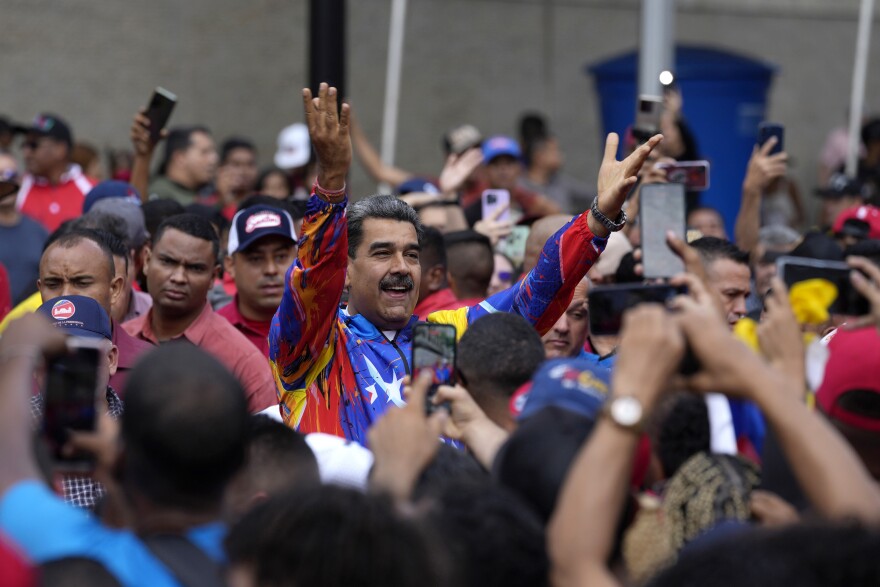The Trump administration has granted Chevron a six-month license to restart oil production and exports in Venezuela, reversing a previous ban that was part of a broader sanctions campaign against President Nicolás Maduro’s authoritarian government, sources told several national news outlets, including The Wall Street Journal and the Washington Post.
Venezuela's Maduro confirmed the news on Venezolana de Televisión, the state-run media outlet on Thursday.
"Chevron has been in Venezuela for 102 years, and I want it to have another 100 years of working without problems," Maduro said.
Chevron, which has been operating in Venezuela since the 1920s, had been pushing for an expanded license that would allow it to resume exports and stem the growing influence of oil companies from China, Russia, Iran and other U.S. adversaries.
The decision by the Trump administration follows a recent high-stakes prisoner swap, in which 10 American citizens held in Venezuela were released in exchange for more than 250 Venezuelan nationals deported from the United States. Though U.S. officials deny a direct link between the exchange and Chevron’s license, the timing reflects a broader recalibration of U.S.–Venezuela policy.
The move comes just four months after the license was revoked due to Maduro’s contested reelection last July and initial refusal to accept U.S. deportees.
READ MORE: Trump revokes Venezuela oil license after backlash from envoy's remarks
The new license, issued by the Treasury Department, allows Texas-based Chevron to operate in Venezuela under strict conditions that prohibit any direct payments to Maduro’s regime, including taxes or royalties.
Chevron told The Wall Street Journal did not comment about the license, but reiterated that it follows all applicable U.S. laws and sanctions.
“Chevron conducts its business globally in compliance with laws and regulations … including in Venezuela,” Chevron spokesperson Bill Turenne told newspaper.
The Miami Herald, citing sources, reported the oil company will pay the Maduro regime in barrels of oil instead of cash through a "specific license," citing sources.
“While we cannot speak to any specific licenses, the U.S. government will not allow the Maduro regime to profit from the sale of oil,” a State Department official told the Miami Herald, a WLRN news partner.
Neither the Treasury Department nor the State Department have issued any official statements about the granting of the license to Chevron.
U.S. Rep. Mario Díaz-Balart, in a social media post on X and in an interview Saturday with Cuban journalist Mario J. Pentón, said he and the two other South Florida Republican lawmakers support the new Chevron license because its provisions do not directly help Maduro. The lawmakers had previously opposed the general license.
"No matter what the Maduro regime says, they will receive no benefits," they each wrote on their X accounts in without directly referencing the Chevron-Venezuela license issue.
No matter what the Maduro regime says, they will receive no benefits.
— Mario Díaz-Balart (@MarioDB) July 24, 2025
There is no greater friend of the cause of freedom for the Venezuelan people than President Trump.
His record is CRYSTAL CLEAR in standing up against anti-American dictators in the Western Hemisphere that…
In a social media post on X on Sunday, U.S. Rep. María Elvira Salazar, wrote that the White House “assured us that NOT a single dollar from Chevron will reach the Maduro regime.”
“We must not, under any circumstance, pump money back into Venezuela’s oil fields,” she wrote.
She added: “I take the President’s commitment seriously. That was his promise.”
But former Miami Congresswoman Debbie Mucarsel-Powell slammed the three Republicans, posting on X that the Chevron license clearly benefits Maduro and his regime.
"Mario, Carlos, and Maria ... put aside the hypocrisy and don't insult the intelligence of Venezuelans, who understand very well what this [Trump] administration is doing," she wrote. "All for their own benefit and to fatten the pockets of those in power."







